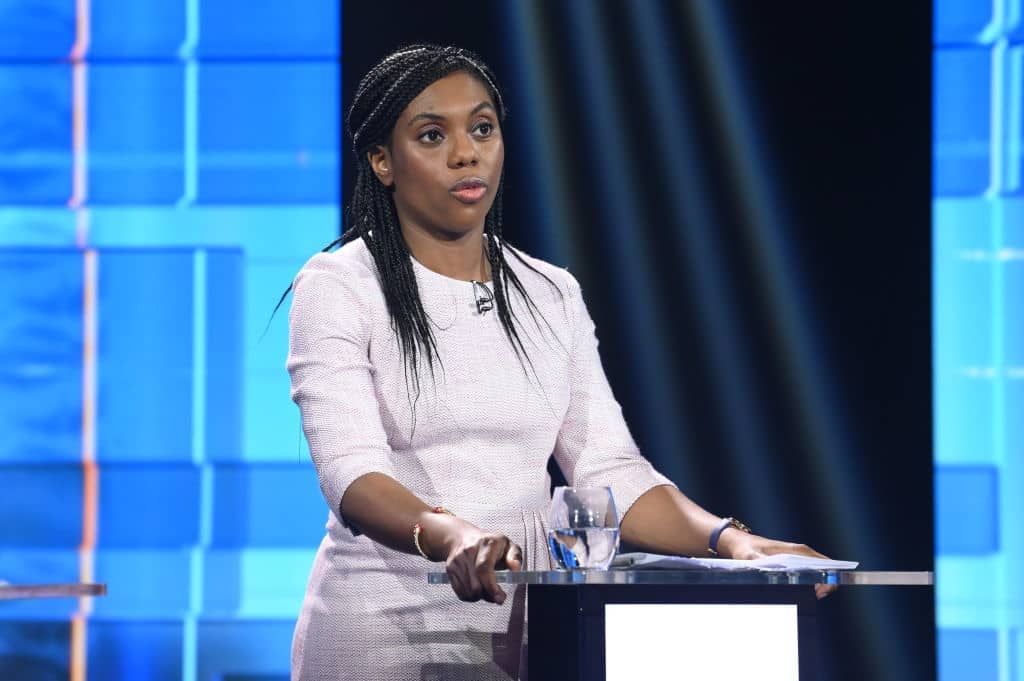Kemi Badenoch is the surprise candidate in the Tory leadership contest. Badenoch was, until a few weeks ago, a relatively lowly minister in Boris Johnson’s government. Now she stands a credible chance of becoming the next prime minister. Her success in facing down her Conservative rivals has catapulted her into the limelight. But for feminists like me who campaign for sex-based rights her impact on the leadership contest isn’t entirely unexpected.
Why? Because unlike her rivals like Rishi Sunak and Penny Mordaunt, Badenoch knows the answer to a simple question: what is a woman? Of all the candidates, her support of sex-based rights, including single-sex spaces and services, makes her stand out in a field of contenders who have dithered and hesitated on this increasingly toxic policy issue.
Rather than tell women who have been attacked by trans activists to calm down and ‘be kind’, Badenoch has stood up for feminists targeted by mobs demanding subservience from women while they steal away their rights. Even in her relatively junior government role, she has made a key difference for worried women: under her watch, the government announced that all new public buildings in England should have single-sex facilities. As equalities minister, she has also faced down demands to reform the Gender Recognition Act to enable sex self-identification.
Whatever you think of Badenoch, it’s clear what she stands for. Can the same be said for her rivals? Hardly. Penny Mordaunt, who has also, like Badenoch, emerged as a dark horse in this contest, once advocated the mantra ‘trans women are women‘ on the floor of the House of Commons. Mordaunt also campaigned for reform of the Gender Recognition Act, in favour of introducing a sex self-identification system that could effectively abolish sex-based rights, at a time when feminist campaigners had raised the alarm of what these reforms might mean for women and children.
In a field now dominated by backtrackers and ditherers, Kemi Badenoch’s resolute position in support for sex-based rights stands out.
As her leadership campaign took off, Mordaunt sought to distance herself from some of the things she has said in the past. Is this because she is worried that her comments about transwomen might torpedo her chances of wooing Tory voters? Or does Mordaunt think her backtracking will ensure women around the country forget her record on this issue? Whatever the reason, her position is in stark contrast to Kemi’s.
Rishi Sunak is also another contender who has worried women with his comments on the gender issue. Back in March, he went on the radio and explained he didn’t have a mind of his own when it comes to defining a woman is. Rather than offer a straight answer to Julia Hartley-Brewer on TalkRADIO, Sunak deferred to however Boris Johnson defines it. The question of defining the meaning of the word woman was put to him six times. He mumbled his way through it, coming across like he needed to consult with a focus group before making up his mind.
Now, Sunak is also backtracking. His first policy as Tory leader, we are told, would be a ‘manifesto for women’s rights‘, with strong support for sex-based rights, including single-sex services and women-only sports. Yet what many feminists see in politicians like Mordaunt and Sunak – and even in their newly-found willingness to speak up on this issue – is far from reassuring. The last few years of relentless campaigning against the imposition of gender identity dogma have left many feminists weary of opportunists who might one day strip their rights away. This is why Kemi Badenoch’s consistent refusal to back down to detractors who resent a woman with a mind of her own is so refreshing.
Feminist campaigner Julie Bindel spoke for many when she wrote about Badenoch’s leadership bid:
‘I would rather give Donald Trump a massage than vote Tory, but if you want to know who I’d back to be the next Prime Minister? Kemi Badenock all the way. She has her head screwed on. Only real grown up in the room.’
Barrister and lesbian campaigner Allison Bailey echoed those comments on Kemi’s potential:
‘Tory MPs will do well to select Kemi Badenoch as the next Conservative leader. She gets the urgency and the importance of standing firm on women and girls sex-based rights and is thoroughly impressive. She is the Tories best hope of securing a victory over Labour at the next General Election.’
Why are feminists backing Badenoch? Because for once in this energy-sapping gender debate there is a clear sign that things are changing. We don’t know much about Badenoch, but what we do know is that she doesn’t back down when it comes to defending women’s rights. She also faces down those who use slogans of ‘diversity and inclusion’ to intimidate their opponents. Whether or not she wins, it seems likely Badenoch will earn herself a cabinet post. There she will serve as a key counterbalance to those who would seek to elevate trans rights over women’s rights. She might also force Labour to finally pause and reconsider its enthusiasm for trans orthodoxy under Keir Starmer.
For now, Labour toys with the idea of a system of sex self-identification, even as lifelong members point out the problems this represents for women and children. Starmer himself is stuck in an incoherent position of both defining women as ‘adult human females’ and also repeating that ‘trans women are women’. Which is it? It simply can’t be both.
Not many feminists tend to vote conservative. Fewer still are single-issue voters. Each candidate, including Badenoch, should have their record on male violence, immigration, welfare policies, foreign policy, the health service, and other important issues examined with a fine-tooth comb. But Kemi Badenoch’s leadership campaign has managed to inspire some hope that a new form of political leadership on the trans issue is possible. Politicians don’t have to quiver and mumble.
In a field now dominated by backtrackers and ditherers, Kemi Badenoch’s resolute position in support for sex-based rights stands out. She may not win the Tory leadership and she may never become prime minister, but the hope of many feminists is that her arrival on the centre stage signals that the time of political fear around the trans issue is over. The excitement her candidacy generates signals that women can stand their ground and win praise, rather than opprobrium.






Comments